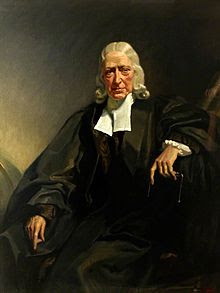 May 24, 1738
May 24, 1738
"I felt my heart strangely warmed..." It was 275 years ago today, that John Wesley was invited to a meeting at church. John was an ordained Anglican priest and the last thing he wanted was another church meeting. It hadn't been that long since he had just gotten back from the colony of Georgia where he failed miserably. He came back to England feeling a complete failure. He was just going through the motions of serving God. I'll let him tell the rest of his story:
"In the evening I went very unwillingly to a society in Aldersgate Street, where one was reading Luther's preface to the Epistle to the Romans. About a quarter to nine, while the leader was describing the change which God works in the heart through faith in Christ, I felt my heart strangely warmed. I felt I did trust in Christ alone for salvation; and an assurance was given me that He had taken away my sins, even mine, and saved me from the law of sin and death."
Wow. Raised in a parsonage by a loving father and mother; taught the basics of Christianity by mostly his mom. Attended Oxford University, then became his dad's associate pastor, invited back to get a Master's Degree. Joined a religious group that did things in a methodical way. Jeered for the time they spent in prayer, worship, Bible study and helping orphans and widows; they were called "Holy rollers, Bible moths, because they took their Bibles everywhere with them. And the worst name they could think of? "You are a bunch of Methodists!" A name that John liked and adapted for this new group interested in living out the faith they had learned.
But it was not until he stopped to listen to God and the power of God to change hearts and remove sin, that John Wesley truly became a Christian. He needed salvation; that right relationship with God that begins with having our sins removed and our hearts renewed, that he was able to say the words we read above. Read them again. Now he "trusts" Christ "alone for salvation." He received an assurance that his sins, "even mine" he writes, "and saved me from the law of sin and death."
What good came of that? 1) He started preaching outdoors. As unheard of as today. He even preached on the tomb of his father because his father's old church did not want the likes of Wesley preaching this "good news" stuff. 2) He starts an orphanage. And it was needed. 3) He started a Sunday school, literally a school that taught the 3-Rs, since children were required to work and not to attend school. Once that changed, the Methodists kept the idea of a Sunday school to teach about God. Yep. We started Sunday school. 4) He travels over most of England by horseback, preaching every place and every chance given. 5) He preaches outside of coal mines to workers with dirty nails and hair that would not be welcome in the "proper" church. One time two men were so angry of what he was preaching they resolved to kill him by stoning him but stopped when they no longer saw John Wesley's face, but that of an angel. They could not stone an angel. A revival breaks out in England that some scholars credit with preventing a Civil War in England; people actually got along! 6)The Methodist Church is established in America by lay preachers that John sent to preach the gospel to all people, moving westward as the country grows, establishing churches and schools, universities, colleges, and hospitals.
The Methodist Church was a movement. Its members were open to God's Holy Spirit to do uncomfortable, outrageous and courageous things; completely different from the state-supported church that cared little or nothing about reaching outsiders. The state-run church was an institution not a movement.
How are we? Sad to say we resemble more the Church of England than we do the Methodist movement. We have turned inward and care more about our buildings and furnishings. Last Sunday was Pentecost Sunday and we celebrated the coming of God's Holy Spirit on that day of Pentecost; the question becomes what have we done about it?
May our prayer this special day be that we would become a movement again, caring for our neighbor and that means recognizing all people as our neighbor, and doing what it takes to reach them for God's Kingdom. Could we preach outside again? Could we start Sunday schools in areas outside of our church, like housing projects or poor neighborhoods? Could we live lives that show that we truly love one another?
Happy Aldersgate Day! May your heart be strangely warmed again or for the first time!
Eradio Valverde